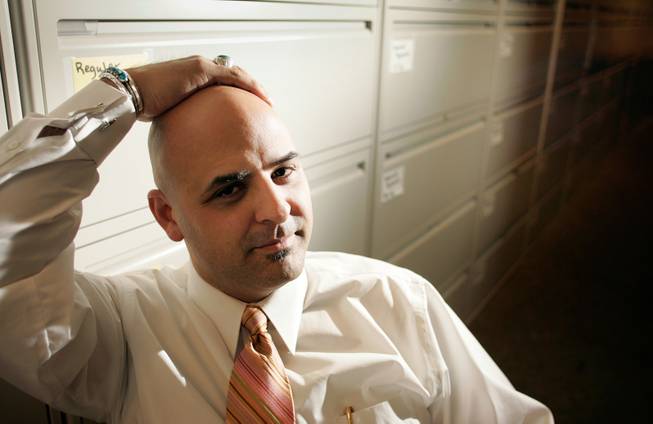
Bernard Zadrowski, who leads the Clark County district attorney’s office bad check unit, says he and his staff process every debt retrieval request they get. Much of the unit’s work over the past several years has been on behalf of casinos that have issued markers evidencing loans to gamblers.
Friday, April 11, 2008 | 2 a.m.

Dennis Wager, who owes $230,000 in casino markers to the Golden Nugget, was in Las Vegas recently to argue against the ability of the district attorney's office to prosecute debtors for money owed to casinos. "I feel like they (prosecutors) took me out to the desert ... took me out and beat me," the Minnesota resident says.
Beyond the Sun
The gambler in the fraying pink jacket has no emotion left. It has spilled from her, heavy black makeup smeared into the deep-set lines of her 40-something face.
It’s nearing midnight on a Wednesday, and the West Texan’s $100 blackjack chips are dwindling and her purse, which had been clenched under her arm, has run dry. She casually motions with her right hand to a Bellagio casino host for a marker, a note that looks like a small check that denotes a loan. Perhaps the walk to the ATM is too far, or her bank account is empty.
The host confers with a computer in the center of about a half-dozen tables, then walks by with a $3,000 marker that she signs quickly. She doesn’t read the fine print — which says a failure to return the money is a criminal offense.
Instead, she jokes: “Cut me off, cut me off.”
The transaction is rapid and subtle, lost amid the building hubbub on the casino floor.
Had she instead used her credit card, collection of the debt most likely would be a civil matter. But failure to pay off a marker can leave a debtor facing prison time or, more likely, probation for a felony conviction. An alternative is to commit to a rigid schedule to pay off the debt — plus an administrative fee to the district attorney’s bad check unit.
What amounts to a civil dispute in most of the nation is a criminal matter in Nevada, as encouraged under a 1983 state statute and practiced since the late 1990s. That statute equates a marker to a check. Thus, an unpaid marker is equivalent to a bounced check, and bouncing a check is classified as theft.
“It’s a crime to steal from somebody,” says Bernard Zadrowski, who heads the bad check unit. “Because the victim happens to be a casino, so what? Casinos have a right to justice just like individuals do.”
Under state law, prosecutors must prove “mens rea,” a Latin phrase meaning intent to commit a crime, in this case fraud, in bad check cases. Some expand that definition to include those with outstanding markers who know there aren’t sufficient funds when accepting that debt, says District Court Judge Stewart Bell, who as a former district attorney founded the county’s bad check unit.
But what if those prosecuted had money at the signing of the marker but ran out when the casinos came calling?
Las Vegas lawyer Robert Langford argues that most people with outstanding markers never intended to defraud casinos. “They’ve lost their shirt,” he says. “If they could pay back their debts, they would ... often, so they can gamble again.”
One former debtor to a Las Vegas casino asked the Federal Trade Commission in 2003 to decriminalize marker debts, but he says the department rejected his request. Critics, including Langford, view Nevada’s system as legalized extortion: The only options are repaying the debt to clear your record or be prosecuted, rather than just being stuck with a bad credit score.
Justice Court Judge Douglas Smith, who used to tend to bad check cases for an hour each day, says Nevada is offering a reasonable solution for everyone involved: “Pay it back and we’ll dismiss it.”
Proponents and critics alike say the practice is another example of the Silver State’s striving “to establish itself as a corporate-friendly state,” as Las Vegas lawyer Kimberly Maxson-Rushton notes in February’s Casino Journal magazine. She encourages other jurisdictions to follow suit. “It is convenient and effective” for gaming establishments “to use law enforcement as a tool to accomplish the end result — collection of the money,” she writes.
The casino industry infuses Nevada’s coffers with more than half of its annual revenue, and “Vegas feeds off the gambling industrial complex,” as one longtime Nevada lawyer puts it.
Some argue that treating markers as bad checks makes prosecutors the collection muscle for the casinos.
“I feel like they (prosecutors) took me out to the desert,” says Minnesotan Dennis Wager, who is being prosecuted for failing to repay the Golden Nugget $230,000 in casino markers. “Nicky Needle took me out and beat me. He’s just called the bad check unit of the Clark County district attorney’s office.”
The unit’s specific objective is to prosecute anyone who fails to repay debts or passes bad checks to businesses, the majority of which are casinos.
Maxson-Rushton says that without the bad check law, foreign debtors to Nevada businesses could more easily avoid paying up than their American counterparts.
But complications related to extradition spare debtors abroad from prosecution.
In recent years, for example, Chinese gamblers have failed to repay upward of $80 million to Clark County casinos, the second-highest debt among residents of a single nation, Zadrowski says. Only U.S. residents owe more. Yet only one citizen of China, Jing Wei Li, has been extradited to Las Vegas for prosecution, whereas hundreds of Americans, including Wager, have been bused here for failing to pay off markers. It often costs more than $1,000 to bring a debtor back to Vegas.
Zadrowski, who worked in a different division of the district attorney’s office at the time of Jing’s extradition, speculates a deputy noticed a warrant was out for Jing’s arrest when he was in custody in Hong Kong a few years ago. Jing owed $4.84 million to two MGM Mirage properties, the MGM Grand and the Bellagio.
But all other foreign debtors will avoid extradition, according to Zadrowski. He says that doesn’t amount to selective prosecution, however.
Nevada’s statute allows debtors to enter the bad check unit’s diversion program to avoid the criminal process — an alternative Zadrowski says is unavailable to anyone extradited to the United States. Foreign extraditions require the assistance of the State Department, the Justice Department and Interpol, agencies that he contends “have no appetite for negotiation.” They expect immediate criminal proceedings.
“It’s contrary to what the statute says,” Zadrowski says.
Asian debtors to Clark County casinos, however, won’t be able to hide if they gamble at those companies’ Macau resorts, MGM Mirage spokesman Alan Feldman notes.
•••
Any business can seek the assistance of the bad check unit — but critics say those ships rise by the tide of casino markers: The bad check unit, they contend, couldn’t survive without the 10 percent administrative fee affixed to markers for $10,000 or more.
The unit, unlike any other department in the district attorney’s office, relies economically on the cases filed. It is designed under statute as a self-supporting unit. Langford contends that violates legal ethics: A district attorney’s office should not tie prosecutions to profit.
The state’s courts, however, have upheld the statute.
Zadrowski says his staff processes all cases, regardless of the size of the debt or the business that submits it.
“I have no dog in the matter,” he says. “I don’t get a bonus. My goal is to break even.”
Yet the percentage of casino-related cases has remained remarkably consistent since 2003, while the number of all cases is markedly down since 2001.
Large retail chains, including Albertsons and Wal-Mart, are relying less on the bad check unit, instead hiring check guarantee companies, according to a 2006 audit of the unit. Zadrowski predicts the number of nonmarker cases will fall further as consumers phase out checks in favor of electronic payments.
Feldman expects casino cases also will drop as civil collection processes continue to improve technologically. Today, MGM Mirage’s properties contact the bad check unit only when “normal collections simply aren’t working,” Feldman says.
As well, Feldman says casino hosts have less authority today than they did 15 years ago, because gaming establishments now rely on credit checks. Hosts sometimes skip that check, but only if they can vouch for a player.
“Hosts say, ‘You’re a good $10,000 player; I don’t want you to be a bad $15,000 player,’ ” Feldman says.
The drop in all bad check cases processed partly explains the deficits the unit racked up through the 2005 fiscal year.
The unit’s annual revenue reached $5.1 million in 2003, then plummeted 47 percent during the next two years. Over those two years, expenditures declined 13 percent and the unit’s staffing level decreased some, but paid overtime increased.
Zadrowski, who took over the unit a little more than three years ago, says he has cauterized much of the bleeding by cutting almost all overtime and employing a smaller staff. Still, the unit had a deficit of $304,000 last year, mostly because of depreciation and an overhead charge levied by the county.

Join the Discussion:
Check this out for a full explanation of our conversion to the LiveFyre commenting system and instructions on how to sign up for an account.
Full comments policy